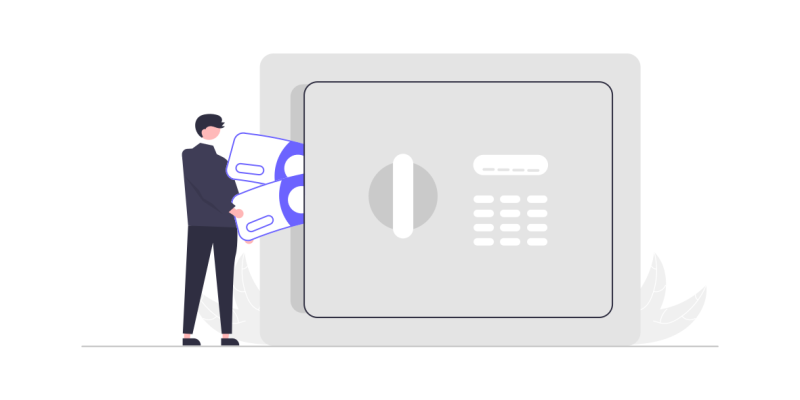You can land an entry-level Big 4 job in Nigeria this year.
Landing an entry-level Big 4 job, or any other entry-level job, in Nigeria is not as hard as people say.
You need to know the right things and have loads of preparation!
A Little Background
In 2017, I was working at a job where salaries never came when due.
You have to wait several months to get your salary.
So, I was always broke and depressed.
Maybe because I always wanted to move the world.
One day, fed up with my situation, I resigned without having a new job.
In the eyes of everyone, this was plain stupidity!
After I left, I touched up my CV, filled out my profile on many job sites, and started applying to any available job.
Looking for a job became my full-time job.
I applied to all the Big 4 firms. One of them sent me a test invite.
I got excited and hopeful, determined to give it my best shot.
At the time, I was living in Aba. So I had to be in Lagos for the test.
In June, I relocated to Lagos, ready to join a Big 4 (without even writing the test yet)
Long story short. Around September 2017, I started working in audit. At a Big 4!

Enough about me. Let’s talk about how you can get in this year.
Landing an entry-level Big 4 Job in Nigeria
First things first.
Let’s talk about who the Big 4 firms are, what entry-level positions are available at Big 4 firms, what requirements you must meet to get an entry-level job, and what interview stages you must pass to join a Big 4…
Who are the Big 4 firms in Nigeria?
Big 4 firms are the four largest accounting firms by revenue.
And they completely dominate public accounting practice around the world.
In Nigeria, Big 4 firms offer assurance (audit), tax, deal advisory and management consulting services.
These firms are…
- PricewaterhouseCoopers (PwC)
- Klynveld Peat Marwick Goerdeler (KPMG)
- Ernst & Young (EY)
- Deloitte
What entry-level positions are available at Big 4 firms in Nigeria?
Big 4 firms in Nigeria usually recruit all year round.
Openings for audit, tax, deal advisory, IT advisory, and management consulting frequently arise.
You only need to bookmark credible job sites to know when they start calling for applications.
When I started out, I used . . .
What are the requirements for joining Big 4 firms in Nigeria?
The entry-level requirements for the Big 4 firms are similar, with only slight variations.
Education
Get it clear today. You don’t need to study accounting or business to join a Big 4.
In fact, studying engineering, physics, or any of the sciences gives you higher chances of getting the job.
Why? First, passing the entrance tests (GMAT, SHL, etc.) is easier for you, thanks to your rigorous scientific foundation.
Second, during the interviews, if you can craft a perfect story showing why you’re moving out of science and into business, then you have a high chance of landing the job.
So, whether PWC, KPMG, EY, or Deloitte, your discipline isn’t so relevant.
Even if you majored in Yoruba and are good with the other requirements, you’ll land the job.
Now that we’re clear on that, your class of degree is another super important requirement.
All Big 4 firms demand a minimum of 2.1 (second-class upper).
If you have a 2.2 or 3rd class, just forget the Big 4 and look elsewhere.
You can only land a Big 4 role with a 2.2 or 3rd class after you have gained significant experience. They call them experienced hires.
Age
Most Big 4 firms will only let you apply if, at the time of applying, you’re not above 26.
Okay, a ton of criticism hurled at the Big 4 firms over this requirement.
My opinion? They have their reasons.
If you join, your colleagues will be super young.
During my onboarding, I met a 20-year old colleague.
It’s also not unheard of to have a manager, who is only 28.
So, you might look weird if you’re 30 and your team lead is 23.
However, the Big 4 firms have started relaxing this requirement.
PWC and EY, for example, will take you on, however old you are (provided you scale the other requirements!)
Experience
For any entry-level position in the Big 4, you don’t need any job experience before you’re considered.
It helps, though, if you’ve leadership experience from school, or have done some internships, or are very good at an extracurricular activity.
But not having any of those won’t rule you out.
Forget experience. Focus on making a solid application.
What are the recruitment stages for entry-level jobs at Big 4 firms?
The interview stages vary from one big 4 firm to another.
However, the stages share many similarities across firms.
PWC Recruitment Stages
PWC recruitment has six stages, and you must clear each stage before you get an offer.
SHL Test (Online)
Saville and Holdsworth Limited (SHL) is an international company that designs personality, behavioral and ability tests.
The SHL test PWC requires you to take will assess your math and language skills. It’s a time-pressured test.
So, you need to know your basic math in and out. And also you should be very good with grammar rules.
Personality Test (Online)
This is more like a culture fit assessment.
PWC uses this to judge if you’ll fit into the culture at the firm.
Usually, there are no wrong or right answers. Just try to be as honest as possible.
Verification Test
After you scale through the SHL and personality tests, you’ll be asked to come to the PWC head office at Victoria Island, Lagos for a physical test.
This is usually the same as the online SHL test.
The verification test helps weed out cheaters in the recruitment process.
If you did the SHL test yourself, you shouldn’t have any problem scaling through this stage.
Panel Interview
At this stage, a group of senior staff at PWC will drill you to determine if you have the right ability, motivation and zeal to succeed at PWC.
Can you talk well? If yes, prepare for the assessment center.
Assessment Center
The work at a Big 4 requires you to work in small teams.
Your team will be responsible for meeting with clients, solving their problems, and preparing management reports that the client will use to improve their business.
Teams that excel have the right team chemistry, usually made up of people who collaborate well.
If you’re a team player, smile and wait for your offer letter.
Offer
After your assessment center, you should get an email to go do pre-employment medicals. That is if you were successful at the assessment exercise.
Once you’re cleared at the medical center, your offer letter is ready for pick up.
Congratulations!
Helpful Resources:
- Master basic mathematics at Khan Academy
- Master Contemporary English grammar
- SHL Past Questions on Dropbox
KPMG Recruitment Stages
KPMG recruitment usually has six to seven stages. You must pass all the stages to get an offer
GMAT Assessment
KPMG uses the GMAT to assess your numeric and verbal ability. It’s also a time-pressured exam. So you must master your basic math and English grammar thoroughly before test day.
Essay Writing
Usually, after you pass the GMAT, you’re required to write an essay.
You get three to five essay topics.
And you’re to choose one topic and write extensively on it.
Below is an example essay topic . . .
“if you were Nigeria’s president, how would you tackle insecurity in your first 100 days in office.“
Business Awareness Test (BAT)
BAT measures your judgment skills.
Here is an example from a typical BAT…
“If your team lead shouts you down in a meeting with clients, will you raise your voice to counter him? Or will you let the meeting end then speak to him politely about his disagreeable behavior?”
There are no right or wrong answers. Knowing the values of the firm will help you tailor your answers.
Assessment Center
AC has three core activities: presentation, group work/activities, and panel interviews.
For presentation, you choose a topic and make a 3 – 5 minute presentation before a panel of interviewers (usually people you’ll be working with if you get in). Your confidence and communication skills are being assessed here.
During the group work, you all are divided into teams and get to solve business case problems or commonsense puzzles. Your teamwork is assessed here.
Finally, the one-on-one interview. It is your last shot to show the panel you’ve got what it takes to excel at KPMG. Make it count!
Partner Interview
After you scale through AC, you’ll be invited to meet a partner at the unit (audit, tax, advisory, etc.) you’ve chosen to work in.
Your story and how well you communicate that story can help you immensely at this stage.
Sometimes, you may have a second partner interview if the first partner isn’t convinced of your abilities.
Offer
If the partner is satisfied, you get a mail for medicals
Finally, you’re on your way to starting your Big 4 life. Congratulations!
Helpful Resources:
- Master basic mathematics at Khan Academy
- Master Contemporary English Grammar
- Master GMAT with the GMAT study pack
EY Recruitment Stages
EY recruitment is in three loaded steps. You need to scale through these three stages to make the cut.
Aptitude Test
This test measures your numerical and verbal skills.
You must ensure your Math and English skills are top-notch before you go for the test.
Assessment Center
AC consists of group tasks and panel interviews.
Once you ace the group task, you will be called in for the panel interview with senior colleagues at the firm (usually people you will be working with from day one).
Offer
After AC comes medical. Once you get through medicals, then you’re in. Congratulations!
Helpful Resources
Deloitte Recruitment Stages
Deloitte’s entry-level recruitment consists of five stages. Unless you pass these stages, there is no offer for you.
Essay Writing
Deloitte requires you to write an essay in the first stage. This is to assess your language skills.
GMAT
The second stage involves the GMAT, which tests your numeric, verbal and analytical skills.
First Round Interview
This is a normal interview where you must answer the standard interview questions and tell the interviewers your story using the “CAR” method.
Second Round Interview
This is a short but engaging interview. Here, the interviewers want to know why you chose Deloitte and what you have to offer.
Offer
Congratulations. You have the job after your medicals.





Leave a Reply